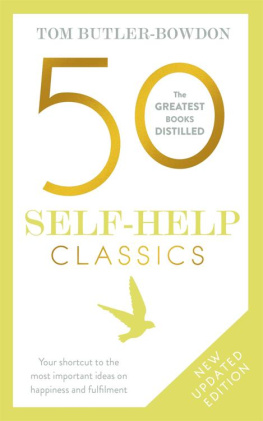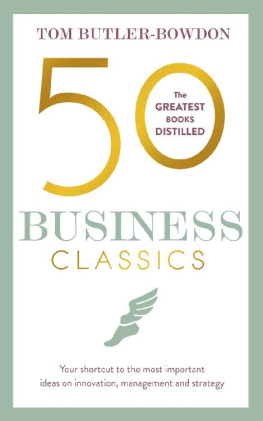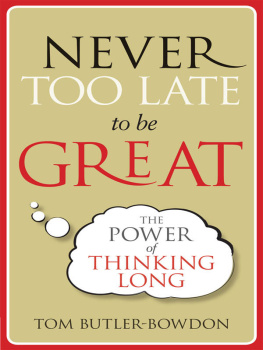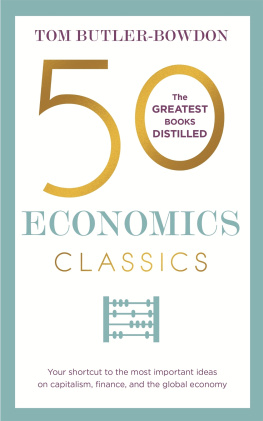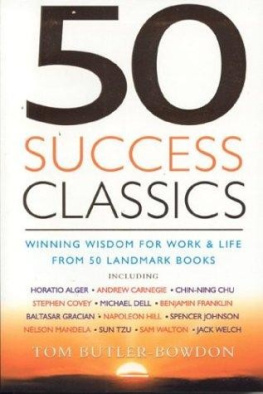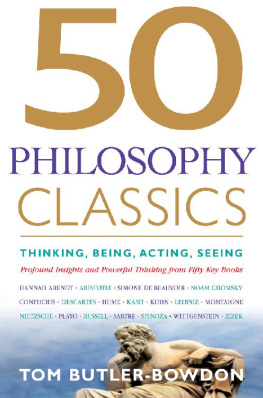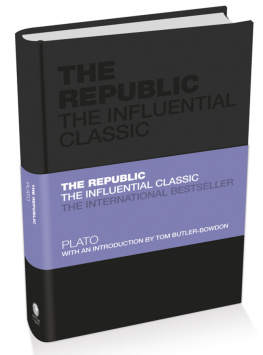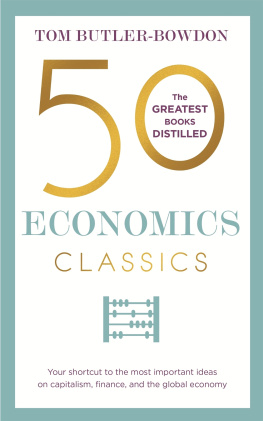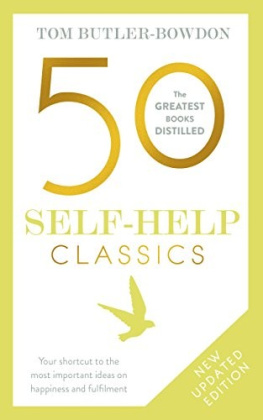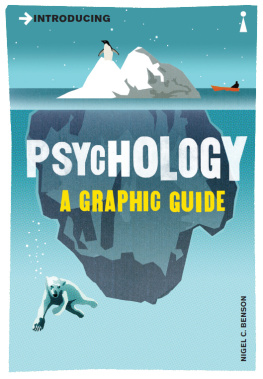50 Psychology Classics
50 Psychology Classics
Who we are, how we think, what we do
Insight and inspiration from 50 key books
Tom Butler-Bowdon

First published by
Nicholas Brealey Publishing in 2007
35 Spafield Street
Clerkenwell, London
EC1R 4QB, UK
Tel: +44 (0)20 7239 0360
Fax: +44 (0)20 7239 0370 | 100 City Hall Plaza, Suite 501
Boston
MA 02108, USA
Tel: (888) BREALEY
Fax: (617) 523 3708 |
http://www.nicholasbrealey.com
http://www.butler-bowdon.com
Tom Butler-Bowdon 2007
The right of Tom Butler-Bowdon to be identified as the author of this work has been asserted in accordance with the Copyright, Designs and Patents Act 1988.
ISBN-13: 978-1-85788-386-2
ISBN-10: 1-85788-386-1
Library of Congress Cataloguing-in-Publication Data
Butler-Bowdon, Tom, 1967
50 psychology classics.
p. cm.
ISBN-13: 978-1-85788-386-2
ISBN-10: 1-85788-386-1
1. Psychological literature. I. Title. II. Title: Fifty psychology classics.
BF76.8.B88 2007
150--dc22
2006026586
British Library Cataloguing in Publication Data
A catalogue record for this book is available from the British Library.
All rights reserved. No part of this publication may be reproduced, stored in a retrieval system, or transmitted, in any form or by any means, electronic, mechanical, photocopying, recording and/or otherwise without the prior written permission of the publishers. This book may not be lent, resold, hired out or otherwise disposed of by way of trade in any form, binding or cover other than that in which it is published, without the prior consent of the publishers.
Printed in Finland by WS Bookwell.
For Cherry
Contents
Acknowledgments
Each book in the 50 Classics series has been a major effort, involving thousands of hours of research, reading, and writing. Beyond this core work, the series is made successful thanks to the team at Nicholas Brealey Publishing.
Im very grateful for the editorial input of Nicholas Brealey and Sally Lansdell in NBs London office, which has made 50 Psychology Classics a better book. Thanks also for the efforts with international rights to ensure that the book will be read by as many people as possible around the world.
Many thanks also to Patricia OHare and Chuck Dresner in the Boston office for their commitment to this book and to the 50 Classics series, and for increasing its profile in the United States.
Finally, this book could obviously not have been written without the wealth of remarkable ideas and concepts expressed in the classic books covered. Thank you to all the living authors for your contributions to the field.
Introduction
In a journey that spans 50 books, hundreds of ideas, and over a century in time, 50 Psychology Classics looks at some of the most intriguing questions relating to what motivates us, what makes us feel and act in certain ways, how our brains work, and how we create a sense of self. Deeper awareness in these areas can lead us to self-knowledge, a better understanding of human nature, improved relationships, and increased effectivenessin short, to make a real difference to your life.
50 Psychology Classics explores writings from such iconic figures as Freud, Adler, Jung, Skinner, James, Piaget, and Pavlov, and also highlights the work of contemporary thinkers such as Gardner, Gilbert, Goleman, and Seligman. There is a commentary devoted to each book, revealing the key points and providing a context of the ideas, people, and movements surrounding it. The blend of old and new titles gives you an idea of writings that you should at least know about even if you are not going to read them, and newer, really practical titles that take account of the latest scientific findings.
The focus is on psychology for nonpsychologists, books everyone can read and be enlightened by, or that were expressly written for a general audience. In addition to psychologists, the list includes titles by neurologists, psychiatrists, biologists, communications experts, and journalists, not to mention a dockworker, an expert in violence, and a novelist. As the secrets of human behavior are too important to be defined by a single discipline or point of view, we need to hear from such an eclectic collection of voices.
The book does not focus primarily on psychiatry, although works by psychiatrists such as Oliver Sacks, Erik Erikson, R. D. Laing, and Viktor Frankl are included, plus some by famous therapists including Carl Rogers, Fritz Perls, and Milton Erickson. 50 Psychology Classics is less about fixes to problems than supplying general insights into why people think or act as they do.
Despite the inclusion of some titles relating to the unconscious mind, the emphasis is also not on depth psychology, or concepts of the psyche or soul. Some of the best popular writers in this area, including James Hillman (The Souls Code), Thomas Moore (Care of the Soul), Carol Pearson (The Hero Within), and Joseph Campbell (The Power of Myth), have been covered in 50 Self-Help Classics and 50 Spiritual Classics, which explore books on the more transformational and spiritual sides of psychology.
The list of 50 psychology classics does not claim to be definitive, just to range over some of the major names and writings. Every collection of this type will be to some extent idiosyncratic, and no claims are made to cover the various fields and subfields in psychology comprehensively. Here we are seeking basic insights into some of the most intriguing psychological questions and concepts, and a greater knowledge of human nature.
The rise of a science
Psychology is the science of mental life. William James
As the early memory researcher Hermann Ebbinghaus (18501909) wrote, Psychology has a long past, but only a short history. He meant that people have been thinking about human thought, emotion, intelligence, and behavior for thousands of years, but as a discipline based on facts rather than speculation psychology is still in its infancy. Even though he made his statement a hundred years ago, psychology is still considered young.
It emerged from two other disciplines, physiology and philosophy. German Wilhelm Wundt (18321920) is seen as the father of psychology because he insisted it should be a separate discipline, more empirical than philosophy and more focused on the mind than physiology. In the 1870s he created the first experimental psychology laboratory, and wrote his huge work Principles of Physiological Psychology.
As Wundt is read today only by those with a specialized interest, he is not included in the list of classics. American philosopher William James (18421910), however, also considered a founding father of modern psychology, is still widely read. The brother of novelist Henry James, he trained in medicine and then transferred to philosophy, but like Wundt felt that the workings of the mind deserved to be a separate field of study. Building on a theory by German neuroanatomist Franz Gall that all thoughts and mental processes were biological, James helped to spread the remarkable idea that ones selfwith all its hopes, loves, desires, and fearswas contained in the soft gray matter within the walls of the skull. Explanations of thoughts as the product of some deeper force such as the soul, he felt, were really the realm of metaphysics.
Next page

